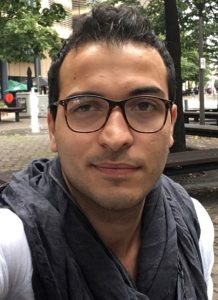Student Spotlight: Joudy Habash
Joudy Habash is a student on the BSc International Disaster Management and Humanitarian Response programme. Originally from Syria, he moved to the UK in 2015 and started looking for opportunities to work or study in the area of humanitarianism, which led him to HCRI. Below he talks about his background and his experience of studying for a BSc.
My family is originally from Syria and I was born in Aleppo. When the conflict began in Syria in 2012, I was in the final years of high school, studying towards my final exams. As the conflict started to escalate and impact day-to-day life, we decided that we had to leave Syria and moved to Turkey. It was in Turkey that I first encountered NGOs and aid workers, as many of them based themselves on the Turkey / Syria boarder to provide support to refugees. I began volunteering with NGOs, helping them with Arabic translation. It was during this time that my eyes were opened to humanitarianism and that I too could help others by working in this field.
In 2015 I managed to move to the UK and was placed in Bradford. I had been out of education since 2012 and this was something I wanted to get back into. When I arrived in the UK it took a while to get all my documents and accommodation sorted but I knew my long-term goal was to study politics or humanitarianism.
Alongside working in a cafe part-time, I started volunteering with a housing association with a focus on helping integrate refugees within the UK. Normally support is structured around helping people access benefits and housing, but actually an important part of moving to the new country is learning how to integrate with the local community and culture. We would provide support across a number of different areas, such as language lessons or guidance and advice on their rights in the workplace.
I was originally due to study at another university, but was then put in touch with HCRI. After speaking to the admissions tutor about the International Disaster Management and Humanitarian Response programme, I was really excited to start in Manchester.
The course has changed my entire life; it’s opened my eyes to the many possibilities that are out there. When I first started studying, we did a lot of reading about the history of humanitarianism and I thought why is this important? Then the more I read, I realised you can’t make improvements or changes to the system unless you reflect on what has happened in the past. The programme gives you the tools to become more critical, and analyse situations and past case studies, rather than just taking things at face value.
What I’m really interested in looking at is how we can educate others in humanitarianism. Many people have black and white views of what’s right and wrong, but it isn’t always as simple as this. What I love about Europe is that people are encouraged to critically reflect and put forward an argument if they don’t agree with something.
I’m still unsure about what I wanted to do after I finish my degree, but I know I want to help others and improve awareness of humanitarianism and the need to promote welfare and social reforms.



0 Comments